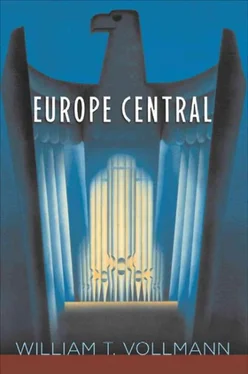He was a ridiculous little man. But he threw back his head to yell: Germany! and his shout drowned out the Kaiser’s; moreover, it grew louder the farther it traveled, and by the time it passed beyond the Egyptian Museum and the Schloss Charlottenburg, it was so loud that our ears burst and we could no longer hear it. And then creepers and vines of fire began rising up to hide Europe, just as they did in Wagner’s Magic Fire music. ‣
WOMAN WITH DEAD CHILD

A new bride cries until sunrise; a sister cries until she gets a golden ring; a mother cries until the end of her life.
—Russian Proverb
1
Berlin 1914, crowds shouting and waving their hats when mobilization was announced, that was her epoch, the epoch of eagles. She’d once met Rodin. That fact alone proves how old she already was in this terrible new Europe.
At the Kaiser’s word they’d overruled themselves, declining to award her the gold medal after all; she was a woman, you see, and with leftist views besides. She stood there whitehaired but still young-looking in her pale smock, her white-sleeved wrists crossed against the darkness, proud and angry in defeat. Karl raged for her, then brought flowers. And now the Kaiser had fled and would never come back. Her familiar, hated, hero-worshiping Germany had died with its heroes, after which the eagles stopped screaming, pretending once again to be stone. What would become of us now? Her only hope was world socialism.
Russian children played with the fallen head of Alexander II’s statue; German children longed for a savior. As for her, she kept making her quick, crude placard drawings of sick men, despairing mothers, children huddled in terror as the skeleton prepared to strike. In a sense, the Weavers’ Series had been her life’s work. In another sense, her life’s work was the iteration and reiteration of a single image, which achieved its final expression where she stood before a woman whom she’d made out of stone, gazing at the woman’s face—her own face—as she wept and stroked the granite woman’s cheeks. That wasn’t yet. Just now she couldn’t stop thinking about Karl’s patient, Frau Becker, who kept losing her children; five out of eleven were already in the ground. Frau Becker used to talk about it as if it had nothing to do with her: The big ones died off, and the little ones were always coming back.—In her honor, Käthe made another etching of a mother with a dead child. Strange to think that she’d once felt at loose ends…
Look! Red flags on Unter den Linden! Soldiers were shouting; who knew what they might do? Karl had begged her to stay home, but she couldn’t have borne to miss this. She was at the Brandenburg Gate when they threw their cockades into the dust. Peter would have joined them in that, she was sure.
Then from the window of the Reich Chancellery Herr Scheidemann proclaimed a Republic. Never mind that all he wanted was to forestall Liebknecht from spreading Lenin’s revolution; God be thanked for the result! Of course it made the eagles scream, but the cheering crowds drowned them out. She came running to witness this, still wearing the pale smock she wore in her atelier; the idea of human brotherhood drew her here. A Republic in Germany! She was so happy now. And then, enraged with herself for having felt happy, she remembered the first victory of Peter’s war, 11.8.14 it was, when we regained Alsace-Lorraine for the Reich: even the Social Democrats had been hypnotized by 11.8.14; we rained roses on our soldiers as they marched through the Brandenburg Gate, and even the family of Dr. Karl Kollwitz hung the Imperial flag from the balcony; they’d never done that in their lives, and never would again. Who celebrated 11.8.14 now? Alsace-Lorraine had long since gone French again, and our soldiers who’d won it were hungry now or maimed or else they were a closepacked line of corpses in a groove of dirt. A moment ago she’d felt happy about Scheidemann’s republic, and for what? Across the street, a crazy little man with a moustache was shaking his fist in a rage, stamping like Rumpelstilzchen, while at her side a crowd of workers kept singing the Internationale.
The fact remained that last year, when news came of the Russian Revolution, she’d wept for joy. She wasn’t ashamed of her tears and never would be.
And now a Republic! Surely there was something fine about that…
She ran home to tell Karl that we had a Republic. He lifted her up in the air in his joy. Then the electricity went out.
The railroad workers struck again; troops guarded the bridges, every soldier with his hand grenade. Here with a hollow clap of horse-hooves came the police; a line of Green Minnas waited to take the prisoners away. And the Spartacists got beaten down; it was the old story; people were singing Deutschland, Deutschland über alles.
They’d sung that when Peter and Hans marched off with their regiments. She remembered Peter’s flag hanging from the balcony, hymns coming from the tower, and then Deutschland, Deutschland über alles. How young they’d all been then! And before that, when he was little, Peter used to shout hurrah! at the zeppelins.
She asked Hans if he remembered, and he nodded silently. He lived separately on the fourth floor.
She heard shooting in the streets. Karl was in the city; she didn’t know where Hans was.
The day she voted for the first time in her life should have been joyous; but the day before that, she found herself writing in her diary: Vile, outrageous murder of Liebknecht and Luxemburg. Everything changed in her Republic forever, just as it already had within her heart once she received the news about Peter. Living over Karl’s office all those years and sometimes hearing the groans of his patients through the floor, she found that the suffering of others pressed upon her ever more tightly; as an artist, as a leftist, as a German and a human being, above all, as Peter’s mother, she couldn’t avoid feeling even had she wanted to. And so she didn’t simply imagine the last moments of the two martyrs; she experienced them. (Karl had likewise wept when he heard.) Nine days later, Liebknecht was buried, along with thirty-eight others. For Rosa Luxemburg an empty coffin near Liebknecht. They’d thrown Rosa in the Landwehrkanal.
The tale of Easter’s empty tomb used to haunt her. If we could only leave death behind! Oh, all those dreams she used to have! She wrote them in her diary; she told them to Karl and to her sister Lise. She tried not to torture Hans with them; that wouldn’t have been fair. The occupied grave was worse, far worse; on the other hand, how many times in her life had she found the stone rolled aside, the skeleton bereft of his prey? The best one could hope for was Scheidemann’s republic. Under those conditions, wasn’t a hollow monument worst of all? Rosa Luxemburg’s coffin wasn’t void because she’d been resurrected, but because she’d disappeared. That was what assassins did nowadays, when they…
She carved the mourners light on dark over Liebknecht’s snow-white bier, her chisel-strokes in each woodblocked face resembling muscles beneath flayed flesh. The Communists told her that she had no right, because she wasn’t one of them. But the family had asked her to come. They’d laid red roses on his forehead, to hide the bullet holes. Outside, the rightists were singing Heil Dir im Siegerkranz.
Liebknecht wasn’t the last. It got almost unbearable, but of course it couldn’t compare with the World War. To get right down to it, what could she do but work, and sometimes catnap in Peter’s room when Karl wasn’t there to be hurt? What he’d always wanted of her was intimacy increasing without limit. She knew now that she’d never desire that, not ever. There wasn’t space.
Читать дальше













